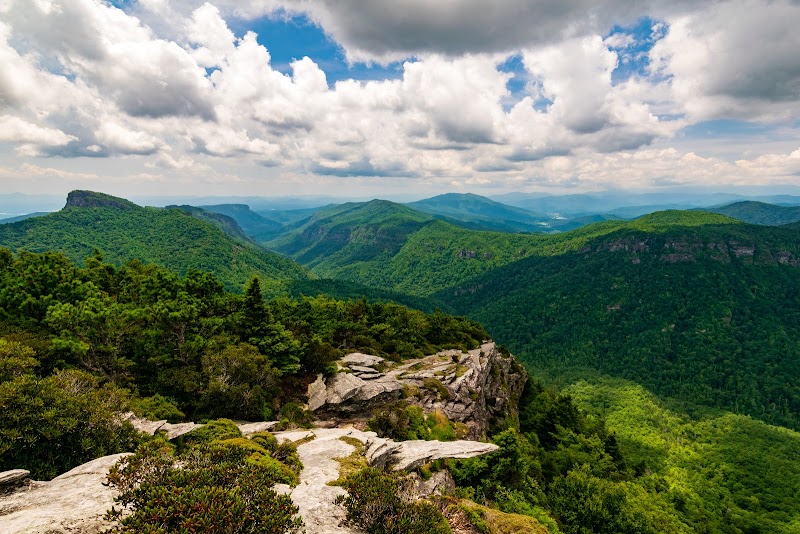
Daniel Boone and the Trail to Grandfather Mountain: A Journey into Appalachian Frontier History
Grandfather Mountain stands as a rugged monument to Daniel Boone’s frontier explorations, challenging hikers with steep trails and wild terrain. Discover how this Appalachian peak tested Boone’s mettle and shaped his path—offering modern adventurers a chance to walk through history while engaging with nature’s raw force.
Wear Sturdy Hiking Boots
The rocky, uneven terrain demands proper footwear with solid ankle support and strong grip to keep you safe on steep sections.
Start Early to Avoid Afternoon Heat
Midday sun can intensify on exposed rock faces; early hikes provide cooler temperatures and softer natural light.
Stay Hydrated and Pack Water
The climb pushes your endurance; water sources are limited along the trail, so carry enough for the journey.
Prepare for Rapid Weather Changes
Grandfather Mountain’s elevation means weather can shift abruptly—layer clothing and bring rain protection.
Daniel Boone and the Trail to Grandfather Mountain: A Journey into Appalachian Frontier History
In the late 18th century, Daniel Boone carved a path through the wild landscapes of what is now North Carolina, where Grandfather Mountain rises fiercely against the horizon. This rugged peak, a challenge even to today's hikers, stood as a gateway between settled lands and the vast Appalachian wilderness that Boone helped to explore and tame. Boone's journeys through this region bridged the known and the unknown, marking his place in American frontier history.
Grandfather Mountain's rocky ridges and dense forests were no mere backdrop; they shaped Boone’s path, testing his endurance and survival skills. Moving through the tangled forest floor, Boone encountered rivers that dared him to cross, rocky outcrops that forced careful navigation, and high ridges offering sweeping views. Each step was an engagement with a landscape fiercely itself—unforgiving yet rich with possibility.
Boone’s exploration here was more than a hunt or passage—it was a practical pursuit of routes that others would follow. His knowledge forged a crevice through the wilderness, laying groundwork for trails still traced by adventurers today. The mountain’s steep elevation gain, rough terrain, and ever-changing weather patterns demand respect and preparation from modern hikers retracing this history.
Today, a visit to Grandfather Mountain offers an immersive connection to that pioneering spirit. The Grandfather Trail, stretching roughly 1.9 miles, navigates a 1,700-foot elevation gain and rugged cliffs that remind you of Boone’s challenges. The path offers forested sections echoing the ancient woodlands Boone once crossed, and open rock faces where the wind whispers stories of past journeys.
If you’re planning your own trek on Boone’s route, prepare for changeable conditions: sturdy footwear with solid grip is essential, and carrying ample water keeps you synced with nature’s rhythms. Timing your hike early morning or late afternoon avoids the peak heat and bathes the mountain in soft light—an ideal way to connect with the terrain’s strength and beauty without overexerting yourself.
Exploring Grandfather Mountain as Boone once did invites you into a dialogue with history and nature, where adventure meets practical challenge. It’s a step back into a time when every move was measured against survival and discovery. Respect the mountain’s power, prepare properly, and you’ll gain not only an epic hike but a deeper connection to the rugged heart of the Appalachian wilderness and the legacy of one of America’s most iconic frontiersmen.
Nearby Trips
All Adventures
Boat Charters
Water Activities
Adventures near Linville, North Carolina
Discover the unique and memorable adventures that make Linville, North Carolina special.
Frequently Asked Questions
Did Daniel Boone actually climb Grandfather Mountain?
Historical records suggest that Daniel Boone explored the broader Appalachian region of western North Carolina, including routes near Grandfather Mountain. While direct evidence of him summiting the peak is sparse, his presence in the area and use of mountain passes influenced early frontier trails.
How difficult is the hike up Grandfather Mountain?
The Grandfather Trail is classified as challenging due to its steep elevation gain of about 1,700 feet over less than 2 miles and rocky terrain. It requires good fitness and sure-footedness, especially on narrow ridges.
What should I bring with me on the hike?
Essential gear includes sturdy hiking boots, ample water, layered clothing for weather changes, and rain protection. Depending on the season, additional items like insect repellent or sun protection are advised.
When is the best time to visit Grandfather Mountain to avoid crowds?
Early mornings during weekdays in spring and fall generally see fewer visitors. Summer and weekends attract more hikers, so plan accordingly if you prefer solitude.
Are there guided tours that follow Daniel Boone’s historic routes?
While no official Boone-specific guided hikes exist on Grandfather Mountain, several local outfitters and historical societies offer tours that explore the region’s frontier history and Boone's legacy.
What wildlife might I encounter during the hike?
Hikers can spot white-tailed deer, black bears (rarely seen but present), various songbirds, and occasionally timber rattlesnakes. Observing wildlife quietly and from a distance is recommended.
Recommended Gear
Hiking Boots with Ankle Support
Provides stability and grip necessary for rocky and uneven trail conditions.
Hydration System (Water Bottles or Hydration Pack)
Ensures adequate water supply as natural sources are scarce along the trail.
Layered Clothing
Allows easy adjustment to temperature shifts, especially in cooler fall and spring conditions.
Rain Jacket
Protects against sudden rain showers common in spring weather patterns.
Local Insights
Hidden Gems
- "Arthur’s Rock Overlook – a less-traveled vantage point with expansive views just off the main trail"
- "Mile High Swinging Bridge area late afternoon offers solitude away from busier paths"
Wildlife
- "The shy Carolina northern flying squirrel inhabits the high elevation forests"
- "Seasonal hawk migrations can be observed from ridge tops during fall"
History
"Grandfather Mountain’s trails were critical corridors during early American settlement, with Boone’s expeditions contributing to mapping and establishing passages through the Appalachians."
